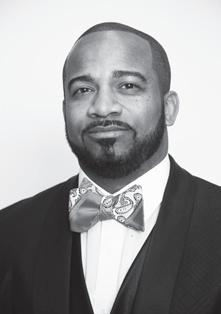
9 minute read
Small business owners—catalysts for economic growth
Sponsored Content
Almost half of all U.S. employees work for small businesses, defined as companies with fewer than 500 employees, and a staggering 99 percent of all U.S. companies fall under the “small business” designation, according to the Small Business Association.
In recent years, however, small business owners have faced many challenges, and that’s particularly true for those in majority Black, Hispanic and Latino communities. Fortunately, data is showing a strong trend toward improvement and normalization. Indeed, entrepreneurship can be a steppingstone to wealth generation.
Many small businesses have more cash than they did before the pandemic, notably the smallest businesses with less than $100,000 in annual revenue. With more than two-thirds of small businesses expecting increased revenue and sales this year, they’re planning to put that money back into their workforce, to hire and retain employees by increasing wages and offering upskilling and training opportunities, according to JPMorgan Chase’s Business Leaders Outlook survey. Black, Hispanic and Lati- no small business owners in particular say they’re optimistic about the year ahead, and the number of new businesses formed in cities like Minneapolis-St. Paul is at an all-time high – in the Twin Cities, new business formation is up 35 percent over the last three years.
“Minority-owned businesses are fueling the U.S. economy – driving growth, innovation and job creation,” said Mikal Quarles, head of Chase Business Banking Racial Equity Strategies. “It’s important that we provide them with tools, resources and network capital to help them take their business to the next level and create of their business. Whether it’s looking for guidance on how to start or grow a small business, or access financial tools, here are some important steps to consider:


Starting a business: Prospective owners can consider a few important foundational pieces, including writing a business plan, establishing a business bank account and applying for and filing the right permits and licenses. Also, prospective business owners should think through their business structure – will they be a sole proprietor, operate an LLC or choose another structure? Gathering funds and deciding where to do business are two more key steps to take before finally launching a company.
Growing a business: As business owners continue to generate revenue, they can shift their focus to growing and scaling their capital and the tools needed to set them up for success.
Last year, JPMorgan Chase introduced a Special Purpose Credit Program to help expand credit access in majority Black, Hispanic and Latino communities for business owners who otherwise might not be approved or receive it on less favorable terms.
JPMorgan Chase also expanded its free one-on-one coaching program to 45 trained senior business consultants in 21 U.S. cities, where they’re providing mentoring and ad-
Bbs
Continued from page 4 vice to Hispanic, Latino and Black business owners within the community on everything from boosting creditworthiness to managing cash flow to effective marketing.
“We’re changing the lens of how we define business success by integrating new practices and products that drive more equitable outcomes,” said Carolina Jannicelli, head of JPMorgan Chase’s Community Impact division, which facilitates the firm’s Racial Equity Commitment. “Our commitment is simply a starting point that is transforming our overall work as a company, driving business and more inclusive economic growth.” and sustain wealth longterm.”
For more tips to help you launch or grow your small business, scan below JPMorganChase.SponsoredContent.bit.ly.42].




Citing access to capital as one of the top barriers for small businesses, banks play a critical role as catalyst in small business success. Over the last few years, JPMorgan Chase has doubled-down on its commitment to help minorityowned business succeed, including through its $30 billion Racial Equity Commitment that seeks to help close the racial wealth gap, such as through new mentorship programs, events, and expanded access to credit for business owners.
Small business owners have a plethora of resources and information available to help them at any stage
Getty Images business. Future financing plans could include applying for additional loans, grants or investor funding. Business banking accounts can be leveraged to help meet the goals of a business owner.
Forging ahead: If a business owner has a few years of success under their belt, they can discover new ways to optimize their business and streamline operations. That includes keeping cash flow healthy, continuing to build their customer base, and looking for digital tools to help simplify processes like invoicing and payments.
Small business owners can also access new tools designed to help lower the barrier to entry to accessing space, how many people I could bring into the fold and help. Just the ability to do something big. I’ve been doing big things on small levels for so many years. I feel like I’ve been built for this—creating for-profits within nonprofits gave me a different perspective.
MSR: How do you feel the business impacts the community?
KEA: I feel that there’s a huge impact because it’s not just a business, it’s multiple businesses. Working with several small business owners to create a place that was in a very good location, one that is at the entry and exit to North and South Minneapolis, and southwest, and that’s right off downtown is ideal to help the economic development of the community. This is such a convenient location that it made me want to have a business here and to grow something here. Minneapolis is my home, so the location is perfect.
MSR: What is your best-selling product?

KEA: Right now, our best-selling product is the event space. I’ve worked with the Farmers Market. I’ve worked with the People’s Market. I’ve worked with many different nonprofits and several different corporations. I’ve worked with a couple of young promoters. Young promoters and entrepreneurs really get it, you know. The Royal Foundry is a distillery as well, so the liquor is the top-selling product. However, I am adding to the menu. We’re going from just alcoholic drinks to a whole line of non-alcoholic beverages—lemonade, seltzers, ginger drinks, kombucha, instant tea, and then with the coffee shop we’ll have our own coffee.
MSR: What do you think the biggest challenge has been so far in owning this business?
KEA: Finding an investor that sees the vision. A lot of investors are really focused on just the numbers. They only look at the ROI [return on investment] as dollars in, dollars out. Finding an investor who sees the vision, understands the dollars that go in and how they multiply dollars going out into the community.
MSR: What do you think has been the most rewarding part so far?
KEA: Seeing people come in here and smile when they find out I’m in the process of buying the place. I mean, knowing that’s my community and they’re happy for me, they’re rooting for me. They’re patronizing us more because they want to see it work and be successful. I think that and my employees.
MSR: What’s your overall vision for this place? What does success look like for you?
KEA: My three-to-five-year plan is to expand to some nonalcoholic beverages, ones that bring in a lot of foot traffic—you know coffee, a juice shop. I’d like to bring in food, a food truck, and add an adult ‘playland’ outside, which we don’t have on the Northside. Inside, I’d really like to make sure that most of the square footage in here is making money.
MSR: Where can readers find the products like the alcohol you sell?
KEA: Currently, we do not have distribution outside of our location. We’ll be going through a whole new rebrand because we’re really, really new. It’s gonna take me a few more months— maybe six months—to get all of the things in play. And then we’ll have some more distribution opportunities at that time. But right now, everything that we have is available here at the Foundry.

MSR: Is there any advice you have for people that want to be an entrepreneur?
KEA: If you think leaving your job to work for yourself is going to be easy, don’t. Because this is 10 jobs versus just one. You really have to have the drive. You have to have the vision, and then you’ve got to have support. A support system is really important. I would say to aspiring entrepreneurs to get out here and do it!
Royal Foundry Crafts Spirits is located at 241 Fremont Ave. N., Minneapolis, MN. It is open from Wednesday to Sunday. For more information, go to royalfoundrycraftspirits.com or call 612-208-1042.
Chris Juhn welcomes reader comments at cjuhn@spokesmanrecorder.com.
Bremer Bank
Continued from page 4 individual entity is what invests into the business entity. It’s important to think of the situation as though the small business owner is investing their individual time, money and effort into their business.”
Spears noted the benefits of doing so. “It makes it easier to ask yourself: What are you getting in return? Approaching the arrangement this way helps in thinking like an investor in your business rather than blurring the lines, which helps maintain healthy boundaries.”
If this sounds confusing, Spears recommended reframing how you view your business and finances.
“If you’re an individual investing in and owning your small business, consider yourself the bank — you’re lending both your time and your money,” said Spears. “Determine whether your lending of these two valuable resources is a good investment or not.”
Invest in yourself and your business
Investing in yourself may sound like a cliche, but it’s a tried-and-true method. By focusing on personal growth, education, and building your skills, you can increase your earning potential, gain new opportunities, and achieve your financial goals. Investing in yourself looks different for everyone but could include everything from enrolling in a course or certification program to gaining new skills, attending industry conferences and events, and networking with other professionals in your field.

Minimize variable expenses
Minimizing variable expenses, like office supplies and equipment, is crucial in managing reported income and qualifying for a mortgage loan as they can quickly add up. While it may be tempting to overspend on business expenses in the short term to grow your business, doing so can have negative consequences in the long run.
One way to minimize variable expenses is by negotiating with vendors and suppliers to secure better materials, supplies, and service prices. For example, you could consider consolidating purchases from a single vendor to negotiate a volume discount or negotiate longer payment terms to improve cash flow.

Another way to reduce variable expenses is by implementing cost-savings measures in your operations, switching to energy-efficient equipment to reduce utility costs, implementing a paperless system to reduce printing and mailing costs, or using social media for marketing and advertising instead of traditional methods. By prioritizing necessary expenses, you can free up funds for a down payment on a home and position yourself for long-term financial stability.
Improve your credit score
In addition to keeping financial documents organized, it’s essential to maintain a good credit score. People with higher credit scores typically receive more favorable terms and interest rates and a wider range of financing options, which can make homeownership more affordable and achievable.
If you have poor credit, don’t fret. You can improve it by paying off high-interest debt first and making timely payments. Keeping your credit utilization low and not applying for too many new credit lines can also improve your score.
“Fortunately, poor credit is something you can proactively work with a credit counselor on,” said Spears. “Each person’s finances are unique and specific to them. Credit counselors can help you better understand your current situation and provide tools to help build your score back up — There are a lot of resources out there!”
Work with a financial advisor
If you’re feeling overwhelmed or like you need additional support in successfully managing your finances, partnering with a financial advisor.
They can help you create a personalized plan and offer guidance on paying off debt, saving for a down payment, investing in retirement and more.
“The very first step someone should take in their homebuying journey, regardless of whether or not they’re a small business owner, is to visit a trusted financial organization that can lend you the money needed for a home,” said Spears. “Work with them to get a mortgage pre-qualification before you go out home shopping. That way, when you fall in love with a house, you can move quickly and know the place is within your budget.”

The bottom line
Buying a home can be daunting, especially for small business owners who face unique challenges when securing a mortgage. But with a bit of planning and perseverance, small business owners truly can make homeownership a reality.
The most important part of the homebuying process is seeking information to fully understand your financial situation and options — and the Bremer team can help! Our mortgage loan officers are well-equipped to help guide you down the path that makes the most sense for your needs and refer you to other real estate and financial experts, as needed. Learn more at bremer.com.
For information about
COVID vaccine, please visit us on the web!









